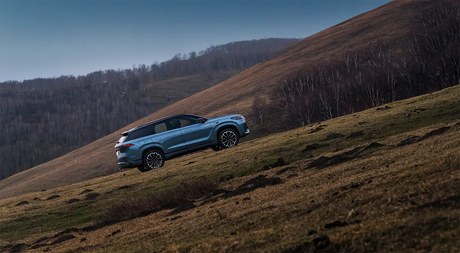Volkswagen Unveils ID.CROSS
When Volkswagen talks about democratising electric cars, it isn’t just fluff for the marketing brochures. With the unveiling of the all-new Volkswagen ID.CROSS, Wolfsburg has made its most convincing attempt yet at building a compact, practical, and—dare we say—affordable EV for the masses.
This isn’t a luxury statement piece like the Audi Q8 e-tron, nor a niche retro-styled runabout like the ID.Buzz. Instead, it’s pitched squarely at the heart of the European market: families, commuters, and budget-conscious drivers who want an EV that doesn’t demand a remortgage. Expected to land in showrooms around summer 2026 with prices starting from roughly €28,000–30,000 (around £25,000–28,000), the Volkswagen ID.CROSS could be the turning point that pushes electric cars from aspirational to everyday.
So what makes the ID.CROSS worth watching, and how does it stack up in a crowded SUV segment already crammed with Teslas, BYDs, and a flood of other newcomers? Let’s dive in.
The Design: Familiar Yet Fresh

Volkswagen has stuck closely to its ID family design language. The ID.CROSS carries the same smooth surfacing, rounded edges, and full-width LED lighting signatures front and rear that we’ve already seen on the ID.3 and ID.4. But being the smallest SUV in the ID line-up, it manages to look a little sportier and less bulky.
-
Dimensions: At roughly 4.2 metres long, it sits between a Polo and a Golf in footprint.
-
Stance: Short overhangs and a slightly raised ride height give it that crossover appeal buyers still crave.
-
Interior: Expect clean digital dashboards, minimal physical buttons, and the now-familiar ID infotainment system. Volkswagen insists the latest version has fixed many of the user interface gripes from earlier cars (touch-slider controls, anyone?).
There’s also been a conscious push towards sustainability—recycled materials in the upholstery, vegan leather options, and trims designed to reduce the car’s overall carbon footprint.
Performance and Range: Sensible, Not Shocking

Volkswagen isn’t chasing Nürburgring records with the ID.CROSS. This is about balance. Expect:
-
Battery options in the region of 45kWh–55kWh, providing ranges between 180–250 miles on the WLTP cycle.
-
Charging speeds of up to 125kW DC, meaning a 10–80% top-up in around 25 minutes—perfect for supermarket runs or coffee stops.
-
Motors: Likely a single-motor rear-wheel drive setup as standard, with a dual-motor all-wheel-drive version potentially following later.
This puts the Volkswagen ID.CROSS squarely against rivals like the Peugeot e-2008, Kia Niro EV, and MG4 XPower, though Volkswagen’s badge appeal and build quality may give it an edge.
Why the Volkswagen ID.CROSS Matters

1. Price Point That Stings the Competition
The starting price of around £25,000 is critical. It undercuts the Tesla Model Y by a large margin, and even makes life uncomfortable for the flood of Chinese imports like BYD Dolphin and Changan Deepal S07.
2. Family-Friendly Practicality
The compact SUV sector is booming because it balances space and city usability. The ID.CROSS promises rear seating space for adults, a decent boot (Volkswagen hasn’t revealed exact figures yet, but expect 350–400 litres), and a higher seating position for that SUV feel.
3. Volkswagen’s Scale and Dealer Network
Buyers might be tempted by newcomers, but many still trust established European brands. Volkswagen has a massive dealer and service presence across the UK, which means fewer worries about aftersales support compared to some new entrants.
The Competitive Landscape

Volkswagen isn’t unveiling the ID.CROSS into a vacuum. Every manufacturer wants a slice of the compact EV SUV pie.
Below is a snapshot comparison of where the ID.CROSS might sit:
| Model | Starting Price (UK) | Range (WLTP) | Charging Speed | Size Category |
|---|---|---|---|---|
| Volkswagen ID.CROSS | £25,000–28,000 | 180–250 mi | Up to 125kW | Compact SUV (4.2m) |
| Tesla Model Y | ~£44,990 | 283–331 mi | Up to 250kW | Mid-size SUV (4.75m) |
| Peugeot e-2008 | ~£34,500 | 212 mi | Up to 100kW | Compact SUV (4.3m) |
| MG ZS EV | ~£30,495 | 198–273 mi | Up to 76kW | Small SUV (4.3m) |
| BYD Dolphin | ~£25,490 | 211–265 mi | Up to 88kW | Hatchback (4.3m) |
This table shows exactly what Volkswagen is targeting: the “affordable but usable” EV sweet spot.
Technology and Features
Expect the ID.CROSS to feature the latest VW tech suite, including:
-
Travel Assist: Volkswagen’s Level 2 driver assistance, offering adaptive cruise control and lane-keeping on motorways.
-
Park Assist Plus: Semi-autonomous parking for tight city spots.
-
Over-the-air updates: Critical as cars become more software-defined. VW promises that bugs can be squashed and features added without a trip to the dealer.
-
Infotainment: A 12-inch central touchscreen with wireless Apple CarPlay and Android Auto.
Safety features are expected to include front and rear automatic emergency braking, blind-spot monitoring, and adaptive headlights—all features that European buyers increasingly demand.
Sustainability Angle

Volkswagen is pushing the ID.CROSS as not just another EV, but as part of its wider decarbonisation strategy. It claims the vehicle will be produced with renewable energy at its Spanish plant and will feature lower lifecycle emissions compared with its petrol equivalents.
This aligns neatly with EU regulations pushing for 2035 zero-emission sales—but also acts as a buffer against Chinese competition, which is increasingly under scrutiny for supply chain transparency.
Challenges Ahead

While the Volkswagen ID.CROSS has clear strengths, there are hurdles:
-
Software Reputation: Volkswagen’s ID range has been dogged by software glitches in the past. If the ID.CROSS inherits these issues, it could struggle against slicker rivals.
-
Battery Supply: Global demand for batteries is fierce, and Volkswagen will need to secure enough supply to make good on its mass-market ambitions.
-
Competition From China: Brands like BYD and Changan are offering compelling specs at equally sharp prices. Volkswagen must prove its premium badge justifies the cost.
UK Market Outlook
For the UK, the ID.CROSS arrives at a crucial time. The government’s 2035 petrol and diesel ban deadline looms, yet EV uptake has slowed due to affordability concerns. A £25k Volkswagen EV that promises familiarity, practicality, and dealer support could be the car that tips hesitant buyers over the edge.
Leasing companies will also keep a close eye. With attractive pricing, solid range, and low running costs, the Volkswagen ID.CROSS could become a fleet favourite. Expect strong interest from company car drivers seeking Benefit-in-Kind tax savings.
Final Thoughts
The Volkswagen ID.CROSS isn’t about headline-grabbing speed or flashy concept styling. It’s about delivering an electric car that everyday families can buy without breaking the bank. By targeting the compact SUV sweet spot, Volkswagen is betting big on volume rather than vanity.
If it delivers the promised price, range, and technology, the ID.CROSS could be a watershed moment for EV adoption in the UK and Europe. The question is whether Volkswagen can iron out its software issues and keep pace with Chinese challengers snapping at its heels.
Either way, the ID.CROSS proves one thing: the affordable electric car is no longer a pipe dream it’s nearly here.




